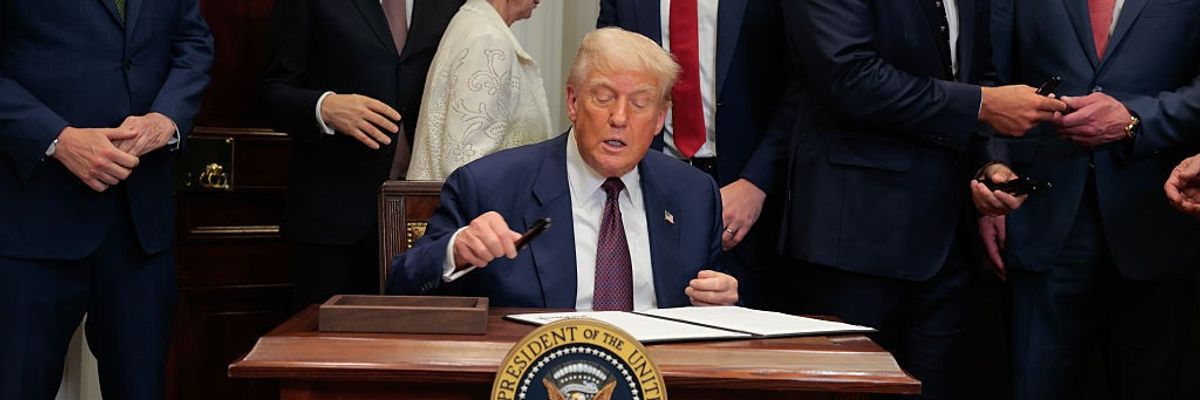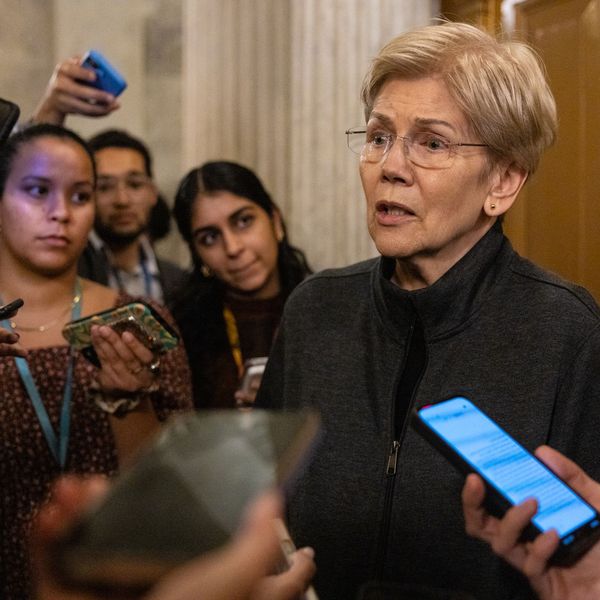
U.S. President Donald Trump signs an executive order in the Roosevelt Room of the White House on July 31, 2025.
'Disaster in the Making': Trump to Open 401(k)s to Crypto, Private Equity Vultures
"Stuffing private equity, crypto, and other 'alternative assets' into 401(k)s is about propping up scams and bailing out an industry that's run out of buyers," said one critic.
U.S. President Donald Trump is expected to sign an executive order on Thursday that would allow private equity and cryptocurrencies into Americans' 401(k)s, appeasing corporate interests that lobbied for the change and disregarding warnings about the risks it poses to retirement accounts.
Citing an unnamed senior White House official, CNN reported that "the order calls for the Labor Department and Securities and Exchange Commission to issue guidance to employers about providing access to those alternative investments in their retirement accounts."
The private equity industry has been working for years to gain access to a portion of the roughly $12 trillion that Americans have saved in workplace retirement plans.
"This is the holy grail for private equity," Axios reported Thursday, noting that federal rules currently bar most defined-contribution plans from investing in private equity and crypto. Both industries spent big on the 2024 election; the investment management behemoth BlackRock, whose CEO has advocated opening 401(k)s to private equity, donated to Trump's inaugural committee.
James Baratta and Whitney Curry Wimbish noted in The American Prospect earlier this year that "there was added desperation from the industry" for access to 401(k)s "because of their dire need for cash amid weakening performance and fewer deals."
"Some firms have begun mortgaging their own funds for money to pay out limited partners," they added. "Retail investors represented trillions in untapped potential."
"Private equity executives have enriched themselves by the billions, taking high fees and other charges from working people's hard-earned retirement savings in pension funds."
Helaine Olen, managing editor at the American Economic Liberties Project and a longtime personal finance columnist, said in a statement Thursday that "stuffing private equity, crypto, and other 'alternative assets' into 401(k)s is about propping up scams and bailing out an industry that's run out of buyers—and it's being done at the expense of Americans' retirements everywhere."
"There's a reason most employers didn't bite when Trump tried this the first time and why the private investments industry has put on such a thick lobbying campaign," said Olen. "These funds are high-fee, risky, and opaque. Private equity consistently underperforms the S&P 500. This is a windfall for billionaire fund managers and a disaster in the making for regular Americans trying to save for retirement."
Last week, the Americans for Financial Reform Education Fund and American Federation of Teachers released a report warning that if private equity is given a foothold in 401(k)s, "millions of workers saving for retirement would be exposed to higher risks and steep fees in products that lack basic investor protections and transparency requirements."
The report found that private equity profitability "has been in a year-over-year decline" for the past two decades and that "fee structures—paid directly by investors or indirectly through portfolio companies—are prone to extensive manipulation."
Lisa Donner, co-executive director at Americans for Financial Reform Education Fund, said that "private equity executives have enriched themselves by the billions, taking high fees and other charges from working people's hard-earned retirement savings in pension funds."
"Now they want fees from the trillions of dollars in individual retirement accounts," Donner added, "putting millions of more people at risk."
An Urgent Message From Our Co-Founder
Dear Common Dreams reader, The U.S. is on a fast track to authoritarianism like nothing I've ever seen. Meanwhile, corporate news outlets are utterly capitulating to Trump, twisting their coverage to avoid drawing his ire while lining up to stuff cash in his pockets. That's why I believe that Common Dreams is doing the best and most consequential reporting that we've ever done. Our small but mighty team is a progressive reporting powerhouse, covering the news every day that the corporate media never will. Our mission has always been simple: To inform. To inspire. And to ignite change for the common good. Now here's the key piece that I want all our readers to understand: None of this would be possible without your financial support. That's not just some fundraising cliche. It's the absolute and literal truth. We don't accept corporate advertising and never will. We don't have a paywall because we don't think people should be blocked from critical news based on their ability to pay. Everything we do is funded by the donations of readers like you. Will you donate now to help power the nonprofit, independent reporting of Common Dreams? Thank you for being a vital member of our community. Together, we can keep independent journalism alive when it’s needed most. - Craig Brown, Co-founder |
U.S. President Donald Trump is expected to sign an executive order on Thursday that would allow private equity and cryptocurrencies into Americans' 401(k)s, appeasing corporate interests that lobbied for the change and disregarding warnings about the risks it poses to retirement accounts.
Citing an unnamed senior White House official, CNN reported that "the order calls for the Labor Department and Securities and Exchange Commission to issue guidance to employers about providing access to those alternative investments in their retirement accounts."
The private equity industry has been working for years to gain access to a portion of the roughly $12 trillion that Americans have saved in workplace retirement plans.
"This is the holy grail for private equity," Axios reported Thursday, noting that federal rules currently bar most defined-contribution plans from investing in private equity and crypto. Both industries spent big on the 2024 election; the investment management behemoth BlackRock, whose CEO has advocated opening 401(k)s to private equity, donated to Trump's inaugural committee.
James Baratta and Whitney Curry Wimbish noted in The American Prospect earlier this year that "there was added desperation from the industry" for access to 401(k)s "because of their dire need for cash amid weakening performance and fewer deals."
"Some firms have begun mortgaging their own funds for money to pay out limited partners," they added. "Retail investors represented trillions in untapped potential."
"Private equity executives have enriched themselves by the billions, taking high fees and other charges from working people's hard-earned retirement savings in pension funds."
Helaine Olen, managing editor at the American Economic Liberties Project and a longtime personal finance columnist, said in a statement Thursday that "stuffing private equity, crypto, and other 'alternative assets' into 401(k)s is about propping up scams and bailing out an industry that's run out of buyers—and it's being done at the expense of Americans' retirements everywhere."
"There's a reason most employers didn't bite when Trump tried this the first time and why the private investments industry has put on such a thick lobbying campaign," said Olen. "These funds are high-fee, risky, and opaque. Private equity consistently underperforms the S&P 500. This is a windfall for billionaire fund managers and a disaster in the making for regular Americans trying to save for retirement."
Last week, the Americans for Financial Reform Education Fund and American Federation of Teachers released a report warning that if private equity is given a foothold in 401(k)s, "millions of workers saving for retirement would be exposed to higher risks and steep fees in products that lack basic investor protections and transparency requirements."
The report found that private equity profitability "has been in a year-over-year decline" for the past two decades and that "fee structures—paid directly by investors or indirectly through portfolio companies—are prone to extensive manipulation."
Lisa Donner, co-executive director at Americans for Financial Reform Education Fund, said that "private equity executives have enriched themselves by the billions, taking high fees and other charges from working people's hard-earned retirement savings in pension funds."
"Now they want fees from the trillions of dollars in individual retirement accounts," Donner added, "putting millions of more people at risk."
U.S. President Donald Trump is expected to sign an executive order on Thursday that would allow private equity and cryptocurrencies into Americans' 401(k)s, appeasing corporate interests that lobbied for the change and disregarding warnings about the risks it poses to retirement accounts.
Citing an unnamed senior White House official, CNN reported that "the order calls for the Labor Department and Securities and Exchange Commission to issue guidance to employers about providing access to those alternative investments in their retirement accounts."
The private equity industry has been working for years to gain access to a portion of the roughly $12 trillion that Americans have saved in workplace retirement plans.
"This is the holy grail for private equity," Axios reported Thursday, noting that federal rules currently bar most defined-contribution plans from investing in private equity and crypto. Both industries spent big on the 2024 election; the investment management behemoth BlackRock, whose CEO has advocated opening 401(k)s to private equity, donated to Trump's inaugural committee.
James Baratta and Whitney Curry Wimbish noted in The American Prospect earlier this year that "there was added desperation from the industry" for access to 401(k)s "because of their dire need for cash amid weakening performance and fewer deals."
"Some firms have begun mortgaging their own funds for money to pay out limited partners," they added. "Retail investors represented trillions in untapped potential."
"Private equity executives have enriched themselves by the billions, taking high fees and other charges from working people's hard-earned retirement savings in pension funds."
Helaine Olen, managing editor at the American Economic Liberties Project and a longtime personal finance columnist, said in a statement Thursday that "stuffing private equity, crypto, and other 'alternative assets' into 401(k)s is about propping up scams and bailing out an industry that's run out of buyers—and it's being done at the expense of Americans' retirements everywhere."
"There's a reason most employers didn't bite when Trump tried this the first time and why the private investments industry has put on such a thick lobbying campaign," said Olen. "These funds are high-fee, risky, and opaque. Private equity consistently underperforms the S&P 500. This is a windfall for billionaire fund managers and a disaster in the making for regular Americans trying to save for retirement."
Last week, the Americans for Financial Reform Education Fund and American Federation of Teachers released a report warning that if private equity is given a foothold in 401(k)s, "millions of workers saving for retirement would be exposed to higher risks and steep fees in products that lack basic investor protections and transparency requirements."
The report found that private equity profitability "has been in a year-over-year decline" for the past two decades and that "fee structures—paid directly by investors or indirectly through portfolio companies—are prone to extensive manipulation."
Lisa Donner, co-executive director at Americans for Financial Reform Education Fund, said that "private equity executives have enriched themselves by the billions, taking high fees and other charges from working people's hard-earned retirement savings in pension funds."
"Now they want fees from the trillions of dollars in individual retirement accounts," Donner added, "putting millions of more people at risk."

